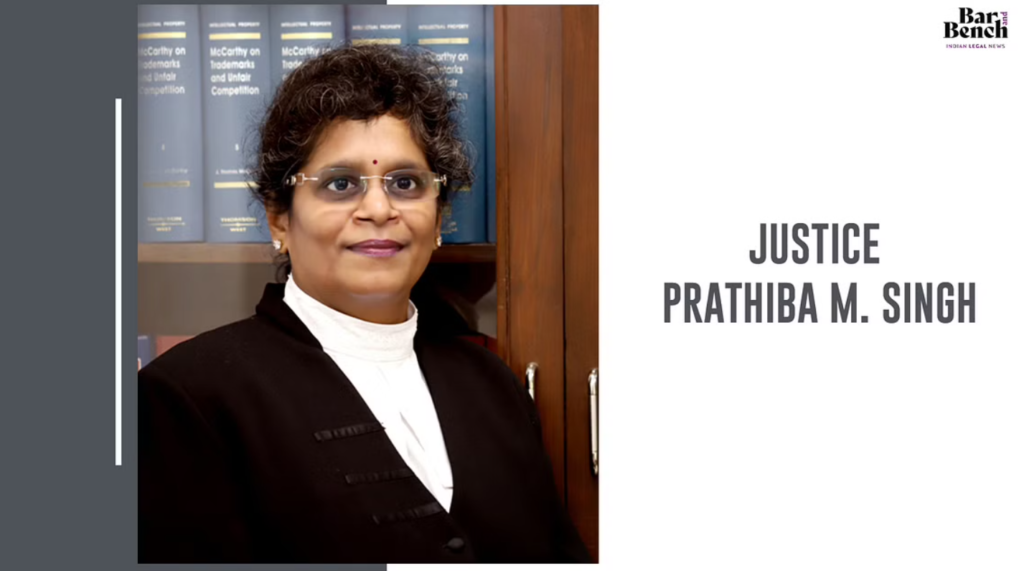Pertinently, Justice Singh advised working women to strengthen the Indian family system’s core values and to live in joint families so as to receive greater support for their careers.
Indian women are a blessed lot since Indian culture and scriptures like Manusmriti give a very respectable position to women, Delhi High Court judge Justice Prathiba M Singh said on Wednesday.
She highlighted that the Manusmriti itself states that if one does not respect and honour women, prayer had no meaning.
“I really think we are a blessed lot of women in India and the reason for that is our scriptures have always given a very respectable position for women and as Manusmriti itself says that if you don’t respect and honour women, all the pooja path that you may do has no meaning. So I think our ancestors and Vedic scriptures knew very well how to respect women,” she said.
Asian countries do much better at respecting women, she added.
“I can tell you that in fact Asian countries do much better in respecting women in households, in workplaces, in society, in general and I think that is because of the cultural and religious background that we have that our scriptures tell us,” she explained.
She also said that India is much more progressive about women being in leadership roles.
“I really think we are lucky to be in a country like India where India is actually much, much more progressive about women being in leadership roles. I am not saying we need to ignore the violence and the bad things that happen to women at a lower level, but yes at the higher level, in the middle level, we are seeing women growing,” she stated.
The judge was speaking at the inaugural session of a conference organised by the Federation of Indian Chambers of Commerce & Industry (FICCI) on the subject Facing the unseen barriers: Addressing Challenges faced by Women in Science, Technology, Entrepreneurship and Mathematics (STEM).
Pertinently, Justice Singh advised working women to strengthen the Indian family system’s core values and to live in joint families so as to receive greater support for their careers.
She said that the joint family system should continue since its benefits are far greater than those of nuclear families. She emphasised that the men in joint families promote women since they are older and wiser.
“That way, we share our resources. Sharing is caring, we do not need to be selfish to say ‘I need my time, I need this.’ You can be a little more adjusting and compromising, but the benefits of a joint family system are far more than what in a nuclear family,” she said.
She urged young women to start encouraging and preparing themselves to live in a joint family system, particularly since the stress of rearing a family was significant for both men and women.
“When there are more people who can take away your tension, who can share your problems with you, the stress also reduces quite a bit. So larger families is the way to go, especially for women who want to have careers.”
During the course of her address, she went on to say that women should never seek sympathy.
“Don’t ever go and say my child is ill, I want to go home, I want to do this, I want to do that. You can always take an off, but you don’t need to give the reason. Just say it is a personal difficulty.”
She added that investing in a robust domestic help system was essential so as to avoid stress relating to domestic duties.
On women in the legal profession, Justice Singh spoke about the biases and taboos surrounding women who choose litigation. She highlighted that their parents fret that no one would marry them.
However, she said that women lawyers make the best spouses, since they understand the difficulties faced in litigating disputes.
She added that with increasing representation in the judiciary, the community of judges and lawyers was growing and creating forums and platforms for regular interactions with young budding lawyers who wish to litigate.
“We have women forums which we have created, where we have regular interactions with women lawyers, young budding lawyers.. who want to litigate. The older women, we encourage them to come into law and to do litigation,” she said.
While discussing at length the contrast in the number of women receiving education in the STEM fields, vis-à-vis women that make it into the work-force, Justice Singh said that it was not simply about empowering women, but putting in place flexible, women-friendly systems.
“It is not about empowerment, it’s about putting the best systems in place to make sure that the systems are women-friendly, the systems are flexible enough to allow women to come up with them and use their educational qualifications to contribute to the country’s progress.”
On the schemes put in place for encouraging women in the STEM fields, the judge elaborated that though we are on the right path, these need to be scaled up drastically.
Article Credits: Bar and Bench
